The biotin ingredients market is estimated to be valued at USD 3.4 billion in 2025 and is projected to reach USD 9.6 billion by 2035, registering a compound annual growth rate (CAGR) of 10.9% over the forecast period.
The biotin ingredients market is projected to register a significant rise, expanding from USD 3.4 billion in 2025 to USD 9.6 billion by 2035, representing a compound annual growth rate (CAGR) of 10.9%. Growth is being driven by the expanding utilization of biotin in dietary supplements, fortified foods, and cosmetic formulations targeting hair, skin, and nail health. Year-on-year analysis indicates consistent value addition, with the market expected to reach USD 5.2 billion by 2029 and USD 7.0 billion by 2032. Increasing awareness regarding nutritional supplementation and the rising incorporation of biotin in functional products are being identified as key drivers contributing to revenue growth.
Throughout the forecast period, the biotin ingredients market is being influenced by the rising preference for health-oriented formulations and preventive nutrition solutions. Integration of biotin in multivitamins, personalized nutrition products, and specialized wellness supplements is being steadily reinforced across global consumer segments.
Market value is being shaped by factors such as formulation versatility, product efficacy, and accessibility across retail and e-commerce channels. By 2035, the market is expected to achieve substantial presence, with consistent expansion observed across the supplement and personal care industries, reflecting the growing recognition of biotin’s functional benefits and its increasing role in value-driven product offerings.
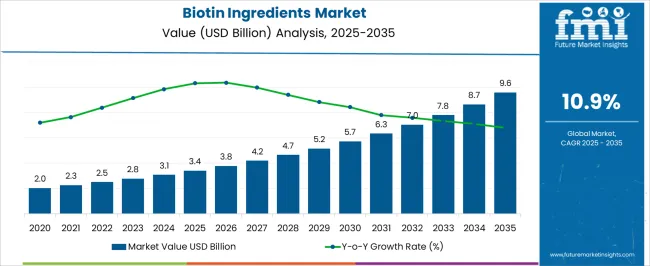
| Metric | Value |
|---|---|
| Biotin Ingredients Market Estimated Value in (2025 E) | USD 3.4 billion |
| Biotin Ingredients Market Forecast Value in (2035 F) | USD 9.6 billion |
| Forecast CAGR (2025 to 2035) | 10.9% |
The biotin ingredients market is estimated to hold a notable proportion within its parent markets, representing approximately 8-10% of the nutraceuticals market, around 12-14% of the dietary supplements market, close to 6-7% of the functional foods and beverages market, about 5-6% of the personal care and beauty products market, and roughly 3-4% of the pharmaceutical ingredients market. Collectively, the cumulative share across these parent segments is observed in the range of 34-41%, reflecting a strong presence of biotin as an active ingredient across health, beauty, and food applications. The market has been influenced by the increasing consumer focus on hair, skin, and nail health, where efficacy, purity, and bioavailability are highly prioritized in procurement and formulation decisions.
Adoption is guided by compatibility with other nutraceutical or personal care ingredients, regulatory compliance, and consistency in performance across products. Market participants have emphasized high-quality sourcing, standardized production, and controlled formulation processes to maintain reliability and effectiveness in finished products. As a result, the biotin ingredients market has not only captured a significant share within dietary supplements and nutraceuticals but has also influenced functional foods, personal care, and pharmaceutical applications, highlighting its strategic role in supporting wellness, appearance-focused products, and preventive health measures across multiple industry domains.
The biotin ingredients market is experiencing robust growth due to rising consumer awareness about the health benefits of biotin in promoting hair, skin, and nail health, as well as its role in energy metabolism and overall wellness. Expanding application in dietary supplements, functional foods, and personal care products is driving demand globally.
Increasing prevalence of biotin deficiencies, coupled with lifestyle-driven nutrient depletion, has further amplified market potential. Technological advancements in biotin synthesis and formulation have enhanced product stability and bioavailability, fostering broader adoption across industries.
Supportive regulatory frameworks and marketing strategies emphasizing natural health solutions are accelerating penetration in both developed and emerging markets. The outlook remains optimistic as brands continue to innovate in product forms, delivery mechanisms, and distribution strategies to meet the growing health-conscious consumer base.
The biotin ingredients market is segmented by type, form, distribution channel, application, and geographic regions. By type, biotin ingredients market is divided into solid biotin and liquid biotin. In terms of form, biotin ingredients market is classified into powder, capsule, tablet, softgel, and other. Based on distribution channel, biotin ingredients market is segmented into direct sales, retail sales, online sales, and other. By application, biotin ingredients market is segmented into pharmaceutical, cosmetics, food & beverage, animal feed, and other. Regionally, the biotin ingredients industry is classified into North America, Latin America, Western Europe, Eastern Europe, Balkan & Baltic Countries, Russia & Belarus, Central Asia, East Asia, South Asia & Pacific, and the Middle East & Africa.
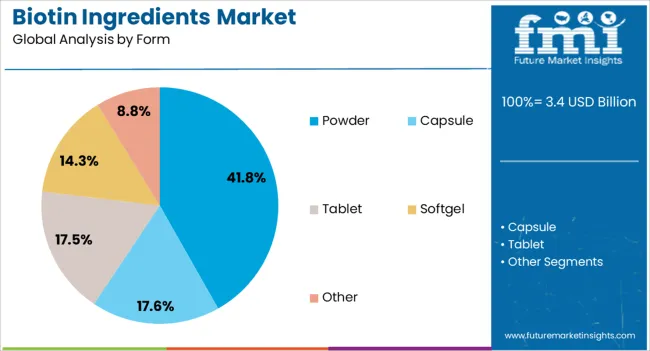
The powder form segment is expected to represent 41.8% of total market share by 2025, positioning it as a leading form type. The popularity of powdered biotin is driven by its versatility in formulation, easy solubility, and compatibility with a variety of applications, including dietary supplements, cosmetics, and food fortification.
Manufacturers benefit from the ability to customize dosage levels, while consumers value its convenience for blending into beverages, shakes, and functional food products.
Enhanced stability during processing and storage further supports its strong market position.
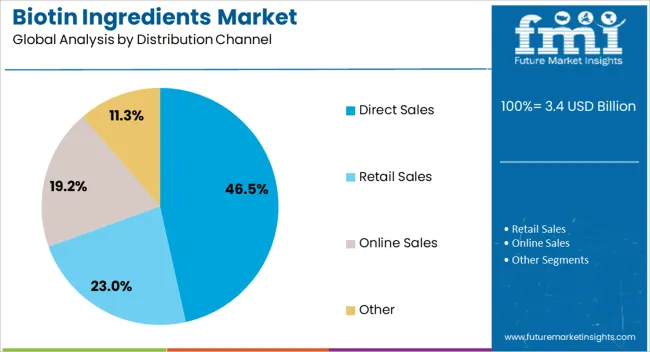
The direct sales distribution channel is anticipated to hold 46.5% of market share by 2025, making it the most prominent distribution method. Growth in this segment is supported by brand-driven strategies that prioritize consumer engagement, personalized product recommendations, and premium positioning.
Direct sales models enable manufacturers to maintain better control over pricing, quality, and customer feedback, while fostering brand loyalty.
The channel’s expansion into online platforms has further strengthened its reach, catering to the growing segment of digitally active, health-conscious consumers.
The biotin ingredients market is growing due to rising demand from health, beauty, and wellness sectors. Opportunities are driven by functional food and beverage fortification, while trends emphasize premium formulations and enhanced bioavailability. Challenges persist from regulatory compliance, pricing pressures, and formulation complexities. Overall, biotin ingredients are being increasingly integrated into nutraceuticals, functional foods, and personal care products, enabling improved consumer outcomes in hair, skin, and nail health, while creating new avenues for product innovation and market expansion globally.
The demand for biotin ingredients has been propelled by growing consumer focus on hair, skin, and nail health supplements. Nutraceutical manufacturers and cosmetic formulators are increasingly incorporating biotin into multivitamins, protein powders, and beauty supplements to enhance product efficacy. Market participants are leveraging clinical studies that demonstrate biotin’s role in strengthening keratin structures and promoting overall wellness. Retail and online distribution channels have expanded access to biotin-based products, driving consistent sales growth. Consumer preference for high-quality, standardized biotin formulations is prompting suppliers to maintain strict quality controls, optimize bioavailability, and provide transparent labeling, reinforcing confidence in biotin ingredients across nutraceutical and personal care applications worldwide.
Opportunities in the biotin ingredients market are expanding as food and beverage manufacturers integrate biotin into functional and fortified products. Ready-to-drink protein shakes, breakfast cereals, and dairy products are increasingly enriched with biotin to cater to health-conscious consumers. Strategic partnerships between ingredient suppliers and food manufacturers are enabling seamless product formulation while maintaining stability and efficacy. Regulatory approvals for nutrient fortification in key regions are creating avenues for wider product offerings. The growing popularity of functional beverages and fortified snacks is expected to propel demand for biotin ingredients, presenting suppliers with new revenue streams and positioning biotin as a key functional additive in the broader food and beverage sector.
Market trends indicate a shift toward premium biotin formulations, including high-potency capsules, liquid biotin drops, and combination supplements. Advanced encapsulation techniques and carrier systems are being employed to improve bioavailability and stability during processing and storage. Consumer interest in personalized nutrition and hair and beauty supplements is shaping product innovation and marketing strategies. Digital channels and e-commerce platforms are increasingly used to communicate scientific benefits and usage guidelines, influencing purchasing decisions. The emphasis on dosage precision, formulation transparency, and brand credibility is reinforcing adoption trends, positioning biotin ingredients as a core component in wellness-driven product portfolios globally.
Challenges in the biotin ingredients market arise from stringent regulatory frameworks, variable labeling requirements, and pricing pressures. Ingredient suppliers must adhere to diverse regional standards regarding dosage, purity, and allowable claims in nutraceuticals, functional foods, and cosmetics. Cost considerations for high-quality, bioavailable biotin can restrict adoption by small-scale manufacturers and private-label brands. Stability during processing and potential interactions with other supplement ingredients further complicate formulation. Industry players are addressing these hurdles by developing standardized and cost-efficient biotin forms, offering technical support for formulation, and navigating compliance requirements, yet these factors continue to influence the pace and scale of biotin integration across product categories.
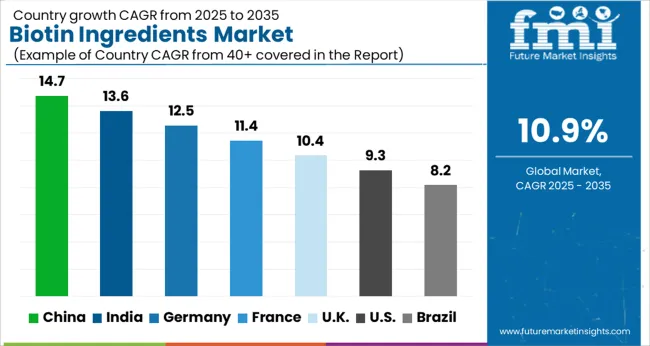
| Country | CAGR |
|---|---|
| China | 14.7% |
| India | 13.6% |
| Germany | 12.5% |
| France | 11.4% |
| UK | 10.4% |
| USA | 9.3% |
| Brazil | 8.2% |
The global biotin ingredients market is projected to grow at a CAGR of 10.9% from 2025 to 2035. China leads with a growth rate of 14.7%, followed by India at 13.6%, and Germany at 12.5%. The United Kingdom records a growth rate of 10.4%, while the United States shows the slowest growth at 9.3%. Rising demand is driven by the increasing use of biotin in dietary supplements, nutraceuticals, cosmetics, and functional foods. Emerging markets like China and India experience accelerated adoption due to growing health awareness, government support for nutritional products, and rising disposable income. Developed economies such as Germany, the UK, and the USA focus on advanced formulations, high-quality standards, and product diversification to maintain steady market expansion. This report includes insights on 40+ countries; the top markets are highlighted here.
The healthcare industry has remained the dominant consumer of ortho phthalaldehyde, particularly in infection prevention and disinfection. Its superior efficacy against a wide range of microorganisms, including bacteria, mycobacteria, and viruses, has made it a reliable choice in high level disinfection of medical instruments. Endoscopy procedures have driven significant adoption, as safe and effective sterilization is mandatory for reusable devices. Growing hospital admissions, surgical procedures, and regulatory pressure to reduce hospital acquired infections have further contributed to higher consumption. Medical centers and diagnostic laboratories have been expanding their reliance on ortho phthalaldehyde due to its shorter disinfection cycle compared to glutaraldehyde, positioning it as a preferred chemical for modern healthcare environments.
The biotin ingredients market in China is projected to grow at a CAGR of 14.7%. Strong growth is driven by increasing demand in dietary supplements, functional foods, and personal care products. Chinese manufacturers are investing in high-purity biotin extraction and formulation technologies to cater to rising consumer preference for health and wellness products. Government policies promoting nutritional supplements, coupled with growing disposable income and urban health consciousness, accelerate adoption. Expansion of distribution networks, rising exports, and partnerships with international brands further support market penetration. The market continues to benefit from consumer interest in hair, skin, and nail health products, ensuring robust growth in China over the forecast period.
The biotin ingredients market in India is projected to grow at a CAGR of 13.6%. Adoption is driven by increasing awareness of hair, skin, and nail health supplements, along with rising functional food consumption. Indian manufacturers are focusing on high-quality production and innovative formulations to meet consumer preferences. Government initiatives promoting nutritional supplements and healthier diets further support market growth. Urbanization, increasing disposable income, and a growing middle-class population create a favorable environment for market expansion. Investments in research and development, along with collaborations between domestic and international companies, contribute to wider availability of biotin-based products. The Indian market continues to grow as consumers adopt preventive and wellness-focused solutions.
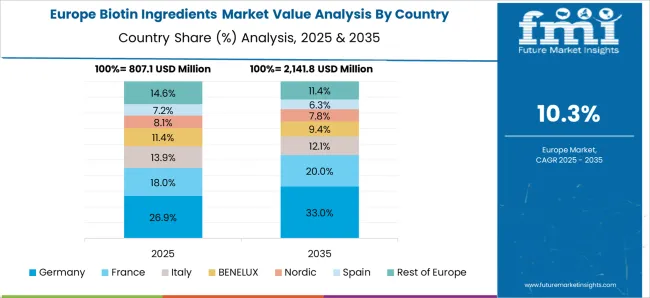
The biotin ingredients market in Germany is projected to grow at a CAGR of 12.5%. Demand is driven by increasing use of biotin in nutraceuticals, functional foods, and cosmetic applications. German manufacturers focus on high-purity ingredients, certified production processes, and compliance with stringent quality standards. Consumer preference for scientifically backed supplements and preventative health solutions supports market expansion. Investments in research and development and partnerships with international brands ensure continuous innovation. The market benefits from Germany’s mature healthcare and wellness sectors, with growing adoption in both professional and retail segments. Regulatory frameworks supporting dietary supplements further enhance growth potential for biotin ingredients.
The biotin ingredients market in the United Kingdom is projected to grow at a CAGR of 10.4%. Increasing demand for dietary supplements, functional foods, and cosmetic products drives adoption. UK manufacturers prioritize ingredient quality, formulation consistency, and product safety to meet regulatory requirements. Consumer interest in wellness, hair, skin, and nail health fuels growth, alongside the rising popularity of personalized nutrition and supplement regimes. Collaborations with international suppliers, research-driven product development, and distribution expansion enhance market reach. Government policies supporting nutritional supplements, coupled with awareness campaigns on health benefits, further strengthen market adoption in the United Kingdom.
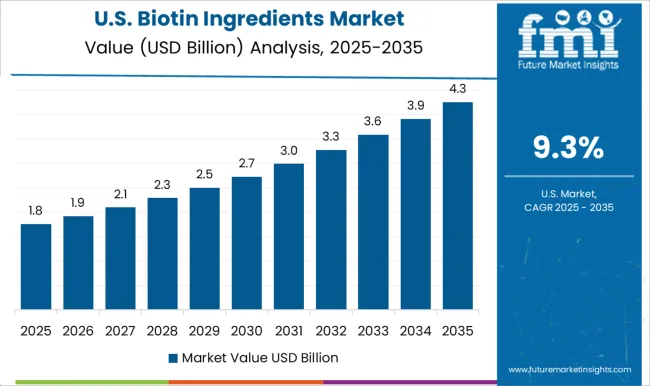
The biotin ingredients market in the United States is projected to grow at a CAGR of 9.3%. Strong adoption is driven by dietary supplements, functional foods, and personal care products targeting hair, skin, and nail health. USA manufacturers emphasize high-quality ingredient sourcing, compliance with FDA regulations, and innovative formulations. Consumers increasingly demand preventive wellness solutions and scientifically backed supplements, supporting steady market growth. Investments in research, partnerships with global ingredient suppliers, and product diversification strategies enhance market penetration. The combination of regulatory compliance, consumer awareness, and growth in health-focused retail channels ensures that the biotin ingredients market in the United States maintains a stable and expanding trajectory.
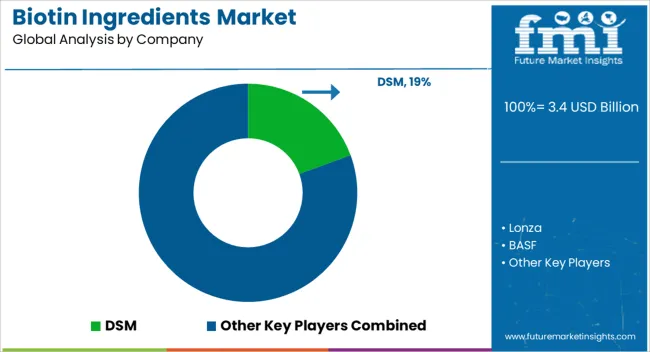
The biotin ingredients market is led by global nutrition and specialty chemical companies offering high-purity, standardized formulations for dietary supplements, functional foods, and personal care products. DSM, Lonza, and BASF dominate with a broad portfolio of biotin products emphasizing bioavailability, stability, and regulatory compliance.
Product brochures highlight applications in hair, skin, and nail health supplements, infant formulas, and fortified foods. Merck and Evonik differentiate with specialty derivatives and customized formulations suited for both food and pharmaceutical sectors. Archer Daniels Midland (ADM), Cargill, and Ingredion focus on large-scale supply, ensuring consistent quality and traceability. Marketing materials underline precision in manufacturing, high safety standards, and global distribution capabilities.
Companies position biotin as a key ingredient for wellness-focused formulations, with brochures often emphasizing scientific validation, dosage versatility, and compatibility with other nutrients. Regional and niche players including Glanbia Nutritionals, Kerry Group, Brenntag, IMCD, Prinova Group, Balchem, and Associated British Foods (ABF) compete by offering tailored solutions, contract manufacturing, and private-label capabilities. Brochures showcase encapsulated, powdered, and liquid forms optimized for stability and absorption.
Competition is driven by purity, consistent potency, and regulatory adherence across multiple regions. Strategic focus centers on enhancing formulation versatility, enabling innovation in functional foods and supplements, and ensuring global availability. Companies are increasingly highlighting supply chain reliability, customization options, and technical support to strengthen market positioning. Biotin ingredient providers emphasize product differentiation, scientific backing, and integration with health and wellness applications, solidifying their role in the expanding nutraceutical and personal care markets.
| Item | Value |
|---|---|
| Quantitative Units | USD 3.4 billion |
| Type | Solid Biotin and Liquid Biotin |
| Form | Powder, Capsule, Tablet, Softgel, and Other |
| Distribution Channel | Direct Sales, Retail Sales, Online Sales, and Other |
| Application | Pharmaceutical, Cosmetics, Food & Beverage, Animal Feed, and Other |
| Regions Covered | North America, Europe, Asia-Pacific, Latin America, Middle East & Africa |
| Country Covered | United States, Canada, Germany, France, United Kingdom, China, Japan, India, Brazil, South Africa |
| Key Companies Profiled | DSM, Lonza, BASF, Merck, Evonik, Archer Daniels Midland (ADM), Cargill, Ingredion, Glanbia Nutritionals, Kerry Group, Brenntag, IMCD, Prinova Group, Balchem, and Associated British Foods (ABF) |
| Additional Attributes | Dollar sales by product type (biotin powder, capsules, tablets, liquid) and application (dietary supplements, functional foods, personal care, pharmaceuticals) are key metrics. Trends include rising demand for hair, skin, and nail health products, growth in nutraceutical formulations, and increasing consumer awareness of vitamin supplementation. Regional adoption, regulatory approvals, and product innovations are driving market growth. |
The global biotin ingredients market is estimated to be valued at USD 3.4 billion in 2025.
The market size for the biotin ingredients market is projected to reach USD 9.6 billion by 2035.
The biotin ingredients market is expected to grow at a 10.9% CAGR between 2025 and 2035.
The key product types in biotin ingredients market are solid biotin and liquid biotin.
In terms of form, powder segment to command 41.8% share in the biotin ingredients market in 2025.






Full Research Suite comprises of:
Market outlook & trends analysis
Interviews & case studies
Strategic recommendations
Vendor profiles & capabilities analysis
5-year forecasts
8 regions and 60+ country-level data splits
Market segment data splits
12 months of continuous data updates
DELIVERED AS:
PDF EXCEL ONLINE
Biotin Gummies Market Analysis - Size and Share Forecast Outlook 2025 to 2035
Biotin Supplement Market Analysis – Size, Share & Forecast 2025 to 2035
Ingredients Market for Plant-based Food & Beverages Size and Share Forecast Outlook 2025 to 2035
Bean Ingredients Market Size and Share Forecast Outlook 2025 to 2035
Milk Ingredients Market Analysis - Size, Share, and Forecast Outlook 2025 to 2035
Malt Ingredients Market Analysis by Raw Material, Product Type, Grade, End-use, and Region through 2035
Aroma Ingredients Market Size and Share Forecast Outlook 2025 to 2035
Dairy Ingredients Market Size and Share Forecast Outlook 2025 to 2035
Pulse Ingredients Market Analysis – Size, Share, and Forecast 2025 to 2035
Smoke Ingredients for Food Market Analysis - Size, Share & Forecast 2025 to 2035
Bakery Ingredients Market Analysis - Size, Share, & Forecast Outlook 2025 to 2035
Baking Ingredients Market Size and Share Forecast Outlook 2025 to 2035
Almond Ingredients Market Size, Growth, and Forecast for 2025 to 2035
Savory Ingredients Market Analysis – Size, Share, and Forecast Outlook 2025 to 2035
Examining Savory Ingredients Market Share & Industry Leaders
Energy Ingredients Market Analysis by Product Type and Application Through 2035
Perfume Ingredients Chemicals Market Size and Share Forecast Outlook 2025 to 2035
Vitamin Ingredients Market Size and Share Forecast Outlook 2025 to 2035
Alcohol Ingredients Market Analysis - Size, Share, and Forecast Outlook 2025 to 2035
Protein Ingredients Market Analysis - Size, Share, and Forecast 2025 to 2035

Thank you!
You will receive an email from our Business Development Manager. Please be sure to check your SPAM/JUNK folder too.
Chat With
MaRIA